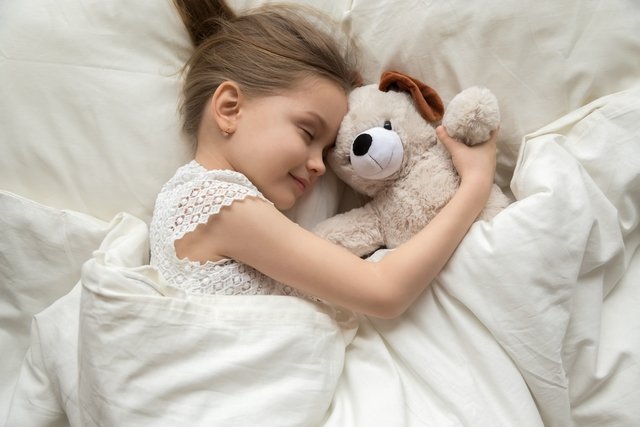Night terrors are a common sleep disorder in children aged 3 to 7 years, occurring more frequently in the transition state between sleep and wakefulness before the REM phase, characterized by symptoms such as crying or screaming during the night but without waking up, and some children may wet the bed or get up and run.
This type of disorder is not the same thing as a nightmare, as it is considered a parasomnia, which is a set of sleep disorders in childhood, due to the physical, verbal and behavioral changes that occur in the episodes, which generally last around 10 to 20 minutes.
The causes of night terrors are not well defined, but they may be related to health problems, such as fever, excessive physical activity, emotional stress or consumption of exciting foods, such as coffee. This disorder can be diagnosed by a pediatrician or psychiatrist and has no specific treatment, with a sleep routine and stress reduction being the most recommended ways to improve night terrors.

Night terror symptoms
The main symptoms of a night terror episode are:
- Crying, screaming or shouting;
- Kicking or struggling in bed;
- Eyes wide and staring, despite not being fully awake;
- Confused and scared child;
- Accelerated heart;
- Excessive sweating;
- Dilated pupils;
- Rapid breathing and heartbeat;
- Bedwetting, in some cases.
Night terror episodes tend to last an average of 10 to 20 minutes and at the time of night terror, the child does not respond to what the parents say, they do not react when they are comforted and some children may get up and run. The next day, children usually have no memory of what happened.
When these episodes of night terrors are very frequent and last a long time, it is important to consult a pediatrician or psychiatrist to confirm the diagnosis.
If you suspect that your child has night terrors, make an appointment with a pediatrician in the nearest region:
Taking care of your health has never been easier!
Do night terrors harm the child?
Night terrors most of the time do not harm the child and do not cause any health problems, however it can happen that the child falls out of bed and hurts himself.
Night terrors only happen to children?
Despite being more common in children aged 3 to 7 years, night terrors can also occur at any age, including adults.
How to confirm the diagnosis
The diagnosis of night terrors is clinical and made by the pediatrician through the evaluation of the symptoms described by the parents, frequency of episodes and physical examination, there is no specific test to diagnose this disorder.
However, your doctor may order tests, such as an electroencephalogram, to rule out other conditions with similar symptoms, such as seizures or narcolepsy. Find out more about what narcolepsy is and what the symptoms are.
Furthermore, another test that the doctor may request is polysomnography, to confirm the diagnosis, as it allows recording brain activity, eye movement, muscle activity and breathing pattern during sleep. See how polysomnography is done.
Possible causes
The exact cause of night terrors is not completely known, however, some factors appear to contribute to the development of night terror episodes, such as:
- Fever;
- Excessive physical activity;
- Excessive caffeine consumption;
- Emotional stress;
- Sleep deprivation;
- Excessive tiredness.
Furthermore, other conditions that affect sleep can contribute to a child having episodes of night terrors, such as obstructive sleep apnea, depression, anxiety or restless leg syndrome, for example.
The appearance of night terrors is not related to spiritualism or religion, it is in fact a child’s sleep disorder, being considered a type of parasomnia. Understand better what parasomnia is.
What to do to alleviate
To alleviate children’s night terrors, parents need to remain calm and should not wake the child, as the child does not know what is happening and may not recognize the parents, becoming more scared and agitated. Therefore, the most important thing is to keep the environment safe and wait for the child to calm down and fall asleep again.
After the night terror ends, parents can wake the child, taking him to the bathroom to pee, avoiding talking about what happened because the child doesn’t remember anything.
The next day, parents should have a conversation with the child to try to find out if there is anything that is making them worried or stressed.
How to prevent episodes
To prevent episodes of night terrors, it is important to know if there is any situation in the child’s life that is causing stress and causing some type of internal conflict, and if this happens, it is recommended to seek help from a child psychologist, as this professional can help with therapy. and techniques adapted to the child.
Furthermore, it is important to create a relaxing sleep routine before bed, such as taking a warm bath, reading a story and playing calm music, as this helps to improve the child’s sleep quality.
Medications should only be used with a pediatrician’s recommendation and are generally only used when the child has some other associated emotional disorder.

Sign up for our newsletter and stay up to date with exclusive news
that can transform your routine!
Warning: Undefined array key "title" in /home/storelat/public_html/wp-content/plugins/link-whisper-premium/templates/frontend/related-posts.php on line 12
Warning: Undefined array key "title_tag" in /home/storelat/public_html/wp-content/plugins/link-whisper-premium/templates/frontend/related-posts.php on line 13



